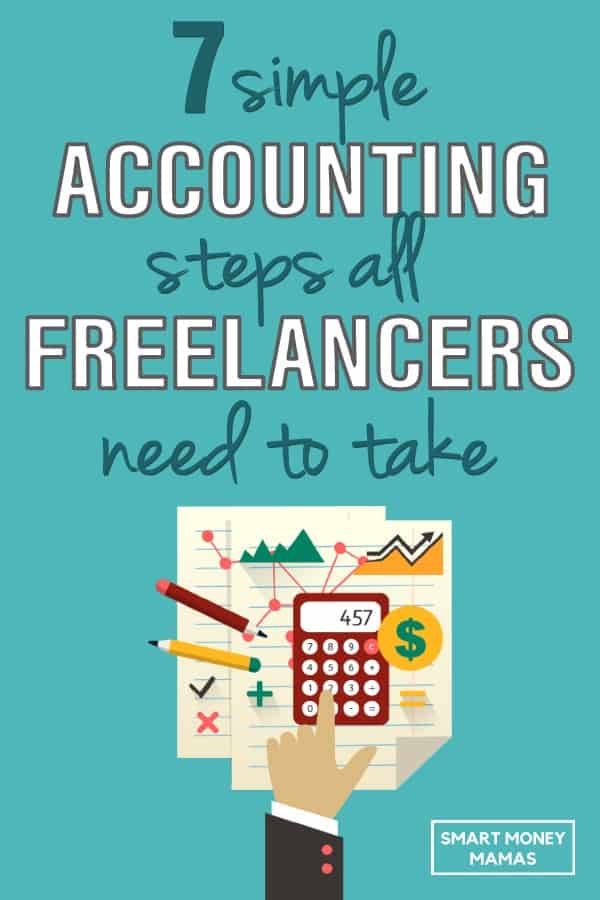Have you been using the “stick your head in the sand” method of accounting?
Whether you decided to hit the ground running when starting your own business and figure bookkeeping out later or are just interested in what you would need to know to begin freelancing, the steps you need to take aren’t as scary as you might think.
Managing your business finances is just part of the game. Ignoring it can result in nasty surprises (taxes, anyone?). Not to mention that not knowing how much you’re earning or spending can make it impossible to know if you’re making the most of your time.
Luckily, no matter where you’re starting, you can get organized for the future today.
Table of Contents
Getting Set Up
Don’t create a lot of barriers to staying on top of your finances. Set up the accounts you need to keep everything you need in one place and easy to track.
Keep Your Accounts Separate
One of the best decisions I ever made as a brand new business owner was to open up a business bank account. This made it so much easier to track my income and business expenses so that I was very clear on how much I would have to pay in taxes later.
Save yourself a lot of headaches and open up a separate account as soon as you start doing business. There are big banks that offer business banking, like Capital One (which also have savings and credit card options), but there are also startups that don’t have fees, like Azlo (just checking). Depending on what you need, you can choose what’s right for you.
Sign Up For An Accounting Software
Especially when you’re new, you don’t need to hire a full-time accountant. There are so many accounting platforms out there these days that are reasonably priced and easy to use. Wave is free, while platforms like FreshBooks and Quicken Self-Employed have a small monthly fee.
Subscribing to one of these platforms will allow you to see your business income and expenses all in one place. You can even link it to your bank account and/or credit card so that it can update automatically, which will save you time and stress.
Staying Organized to Reduce Surprises
Staying on top of your bookkeeping is an ongoing job. If you don’t want to be shuffling around for receipts at the end of the month or stressing about a tax bill due next week, put these systems in place to reduce surprises.
Save Your Receipts
Even if you have an accounting platform tracking all of your income and expenses, you should still save your receipts. This will be helpful when you’re filing your taxes since you’ll be able to double-check the type of expense it is.
It will also be essential if you ever get audited. But you don’t need to keep a shoebox fo paper. Photos or scans of receipts are valid to IRS auditors. Many accounting platforms, like Quicken and Freshbooks, have a tool that allows you to snap a picture and email it directly to a unique email address that uploads to your account.
If you aren’t using a bookkeeping software, many freelancers and small business owners create an email address exclusively for receipts. Send the photos and forward digital receipts directly to that address so you’ll always have them if you need them.
Set Aside Tax Money As You Go
This is incredibly important!
When you are self-employed, you don’t have a payroll department taking taxes out of your paycheck for you. This is a not-so-fun task that you have to do yourself.
My advice would be to automatically set 30% of your income aside as soon as you get it. Set up a savings account that you nickname “taxes” and don’t touch it for anything else.
You will also need to pay estimated quarterly taxes as a freelancer, so it’s important to have that money on hand.
If you know that you won’t remember to take this step, or if it’s just not something you want to handle yourself, there are companies out there that will do it for you. For example, you can set up an account with Painless 1099 and they will automatically set tax money aside whenever you get paid.
Save for Emergencies
Having emergency savings is not just applicable in your personal life. Your business needs an emergency fund too!
Get clear on what your overhead costs are and make sure you have a few months worth of those costs saved up at all times. Freelancing and small business income can be unpredictable and you don’t want to get caught short on cash.
Set up an emergency fund to ensure that you can always pay your business bills, even if you have a lean month.
Hire a Bookkeeper
You may not be able to hire a bookkeeper from the beginning of your entrepreneur journey. I personally haven’t hired one for myself yet, and I’ve been in business for almost 3 years!
But if you find that you’re struggling to stay on top of your business expenses, it may be worth the cost to outsource the work.
Bookkeepers typically charge hourly. If your business grows large enough that you interact with a business accountant, their services usually offer bookkeeping as an add-on.
Hire a Tax Expert
As your tax situation gets more complicated, the time may come that you should hire a tax expert to file your taxes for you.
Yes, this costs money, but it might actually save you money in the long run. An expert knows exactly what you need to include when preparing your tax returns, and can get you as many write-offs as possible. Plus, you can write off the cost of filing your taxes, as it counts as a business expense!
My life changed a lot in 2018. I went full-time with my business, I owned a home, I got married, and I ran an Airbnb out of my basement. I didn’t feel confident that I would be able to prepare my taxes as well as an expert, so I hired one.
It’s an excellent investment in peace of mind.
Accounting is Part of Responsible Business
Staying on top of your business finances might not be the most fun part of being your own boss, but getting organized can save you a lot of money and stress along your journey.
Whether you choose to keep track of everything in a simple spreadsheet or use software and experts, make sure you know where you stand. It may even make you more profitable in the long run!
We want to hear from you! What do you think is the hardest part of freelance or small business accounting?



